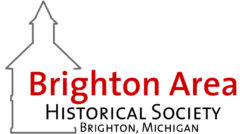In 1907, Henry Fitch was one of the some 800 former residents of Brighton to return from all points of the compass to attend a Home Coming celebration. Henry had been away for more than 50 years, and at a mass meeting at the old “Opera House” (today, Stouts Bar on Grand River) reminisced, in part, as follows:
“My early recollection of Brighton was associated intimately with wolves, bears and panthers; and that children were not permitted to be out after dark for fear wolves would get them. In the winter of 1845, my father went to Pine Run, taking me with him.”
“We left in the forenoon of the next day to return; the snow was deep and the weather cold, and there was not a house for many miles. Just before dark we were surrounded by a pack of wolves, one or two on each side of us yelping, snarling and jumping in the snow. Gradually the number increased and it became dark. There were about twenty of them and they were getting very familiar with the horses; too near for comfort. The horses were put into a run and the last mile from what was known as the Dean Settlement (east of the cemetery on Flint Rd.) to our house (where the Canopy Hotel now stands) the horses were on a dead run, the wolves keeping close company until within fifty rods of the house.”
In 1985, 140 years later, three apartment complexes and several private homes are located along the mile. One group of apartments is advertised as the “Quiet Place.” What commotion, excitement and concern would be generated by the residents along the mile today at the sight and sound of a pack of wolves menacing a man and his boy while riding in a sleigh loaded with lumber and drawn by galloping horses with foam freezing on their whiskers.
Henrys reminiscences dont mention the pleasant sound of sleigh bells worn by the horses on a strap around their bodies. These bells had nothing to do with the Christmas holidays. They served a very utilitarian purpose. Running on the hard packed snow there was not much sound to alert drivers of an approaching sleigh. Nights were DARK. Few of us today can experience that kind of darkness. Horses were usually seen with their ears pointed forward, to better hear the bells on other houses and therefore avoid an accident.
Used by permission of Wm. Pless, Brighton.
